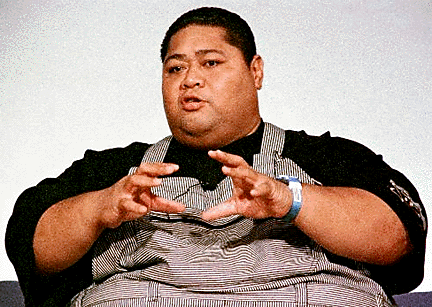

Sumo
Associated Press
Friday, November 6, 1998


Konishiki’s big
on Japanese TVMAKUHARI, Japan -- Weighing well over a quarter ton, Konishiki was the quintessential sumo wrestler -- a hulking, glaring presence who seemed to enjoy nothing more than to strike fear in the hearts of the toughest guys Japan had to offer.
But since retiring from the sumo ring, the Hawaiian-born giant is cultivating a new image. These days, Konishiki is cute, cuddly and mellow.
And he's -- easily -- the biggest thing to ever hit the Japanese entertainment world, whether plugging whiskey in television ads or co-hosting a prime-time talk show.
"I enjoy every second," said Konishiki, or Salevaa Atisanoe, in a recent interview. "I'm just being myself."
Still, it's been a surprising metamorphosis.
For more than a decade, Konishiki's 640-pound fighting weight and yield-no-ground stare made him one of the most feared wrestlers in Japan's national sport, sumo.
He was also one of the most successful -- and controversial.
Sumo wrestlers are subjected to a strict ranking system based mostly on how well they fare each tournament, and Konishiki set several important precedents. He was the first foreign wrestler to reach the rank of ozeki, the second-highest in the sport.
But although Konishiki was one of Japan's most popular wrestlers and won three tournaments -- another feat no foreigner had ever accomplished -- the sport's governing body chose not to give him the top rank of "yokozuna."
When he was up for promotion in 1992, one member of the selection committee wrote that no foreigner had the "dignity" to achieve yokozuna. He noted that Konishiki had cried after winning his first tournament, a no-no in the stoic world of sumo.
Soon after, Konishiki was quoted in both American and Japanese media as accusing Japan's Sumo Association of racism. The report sparked a volley of recriminations -- cooling down only after Japan's prime minister urged calm.
Konishiki denies having ever made the racism allegations and today strikes a deliberately conciliatory tone toward whatever prejudice he may encounter.
"If you try to fight it, you just drown in the current," he said.
The question of whether a foreigner should be elevated to yokozuna is now moot -- another Hawaiian-born wrestler, Akebono, or Chad Rowan, has held the rank since 1993.
And if the 34-year-old Konishiki is drowning in anything now, it's adoration.
Konishiki's jam-packed days are a testament to the scheduling talents of his manager, who hovered in the background barking into a cell phone as the former wrestler settled into an interview at a plush suburban Tokyo hotel.
True to his new image, Konishiki, clad in overalls, was as laid-back as could be -- a more luxurious sprawl would have required a bigger sofa.
The enthusiastic response to Konishiki's move into entertainment suggests his new enjoying-it-all image may have struck a chord in this fast-paced, workaholic country.
Part of his appeal may also lie in his decision to strike out in a new direction mid-career, something that's still next to impossible here, especially for sumo wrestlers.
Konishiki is quick to credit sumo for opening the door to stardom, but says he is glad to be moving on.
There's no more pressure from tournaments. The strict ceremony and etiquette of sumo don't apply to him anymore. He spends more time at home with his wife, Sumika, a former model.
And, of course, there's no more of the enormous pots of "chanko" stew served twice daily on sumo training tables.
Instead, Konishiki takes smaller, more regular meals, eating breakfast for the first time since becoming a wrestler 16 years ago.
The result: He's lost 66 pounds.
"I feel great," he says.
One of nine children whose father was a civilian worker at the U.S. Navy base at Pearl Harbor, Konishiki says he would never have left his home in Nanakuli if a persistent sumo recruiter hadn't persuaded him to come to Tokyo.
He founded the Konishiki Kids Foundation two years ago to bring sixth graders to Japan. This year, 300 students applied for 35 spots.
"Japan has been good to me," he said. "But the best thing I can do now is to help my own community."
Akebono will miss
Associated Press
Kyushu tourneyFUKUOKA, Japan -- Yokozuna Akebono, who injured his lower back during Monday's practice, said today he will withdraw from the Kyushu Grand Sumo Tournament, which gets under way Sunday.
The Hawaiian-born grand champion and his stablemaster Azumazeki made the decision after Akebono, or Chad Rowan, underwent an examination this morning at a Fukuoka hospital and was diagnosed as suffering from separated vertebrae in his lower back.
The 29-year-old yokozuna, recovered from a swelling in his neck last month, hit his lower back hard on the ring's straw ridge in Monday's practice bout against ozeki Musashimaru and has not trained since then.
"I have had some pain in my lower back for three or four days. I'm very disappointed because I had been in good shape," said Akebono, who reportedly needs one month for full recovery.
The withdrawal will be the ninth time that Akebono has skipped a tourney and the first since he pulled out from the Kyushu tourney one year ago.
The nine-time Emperor's Cup winner had a record of 10 wins against five losses in the autumn basho in September and was ranked as the second yokozuna on the east side for the 15-day meet at the Fukuoka Kokusai Center.
For more sumo information
online, try Sumo Web!